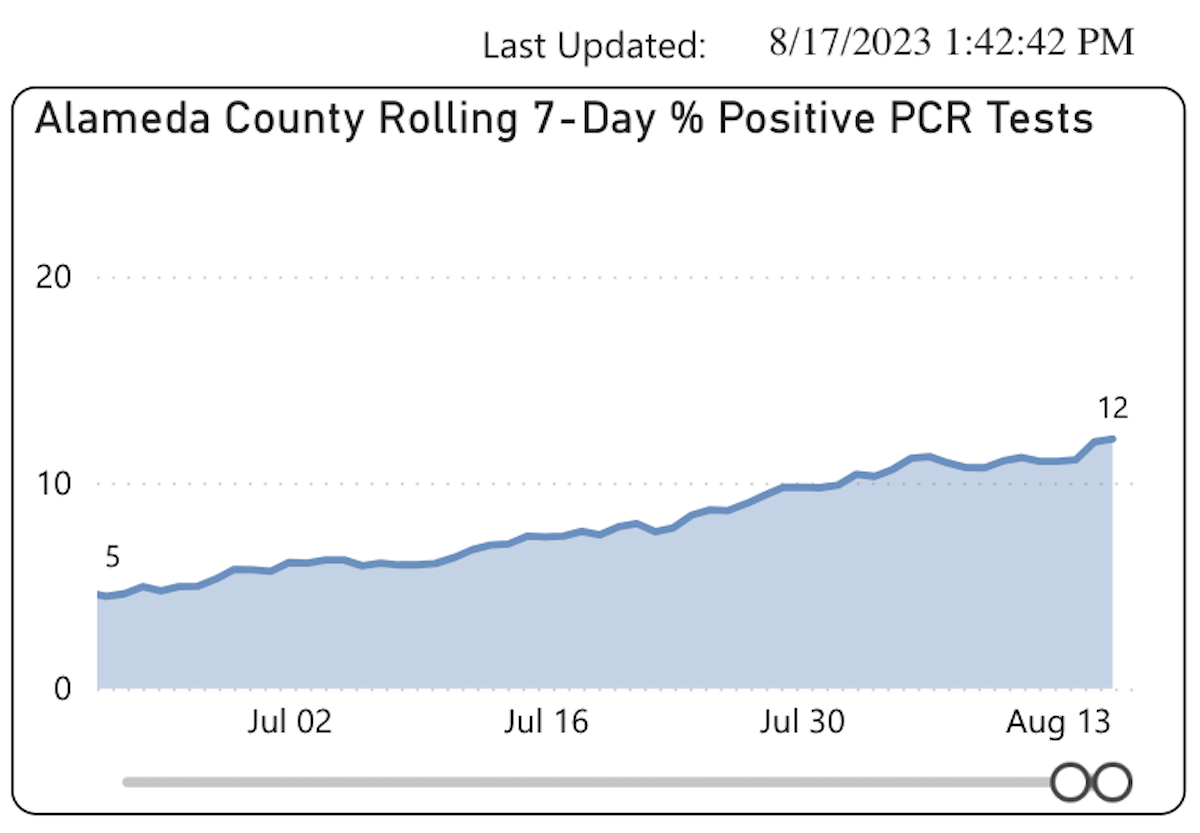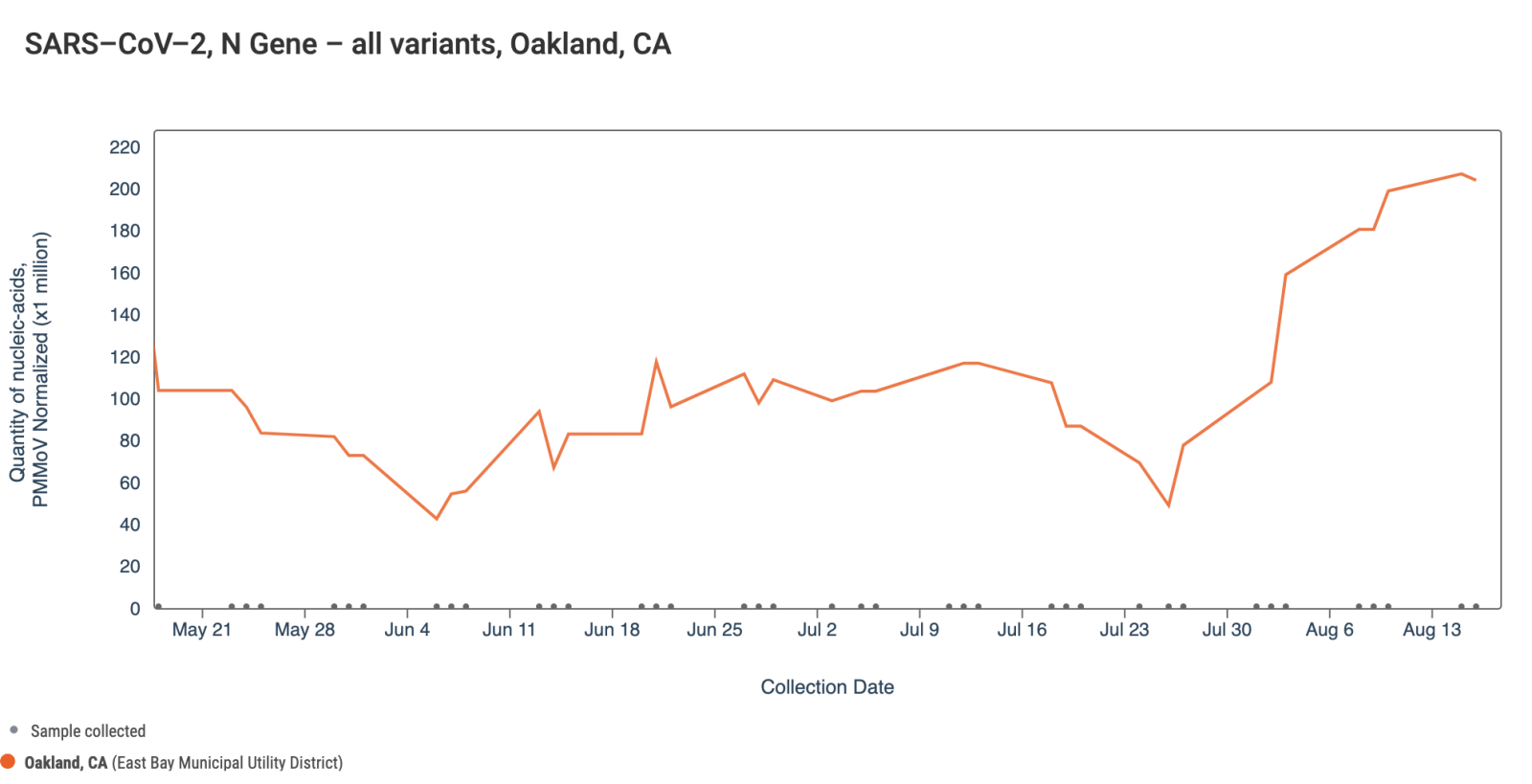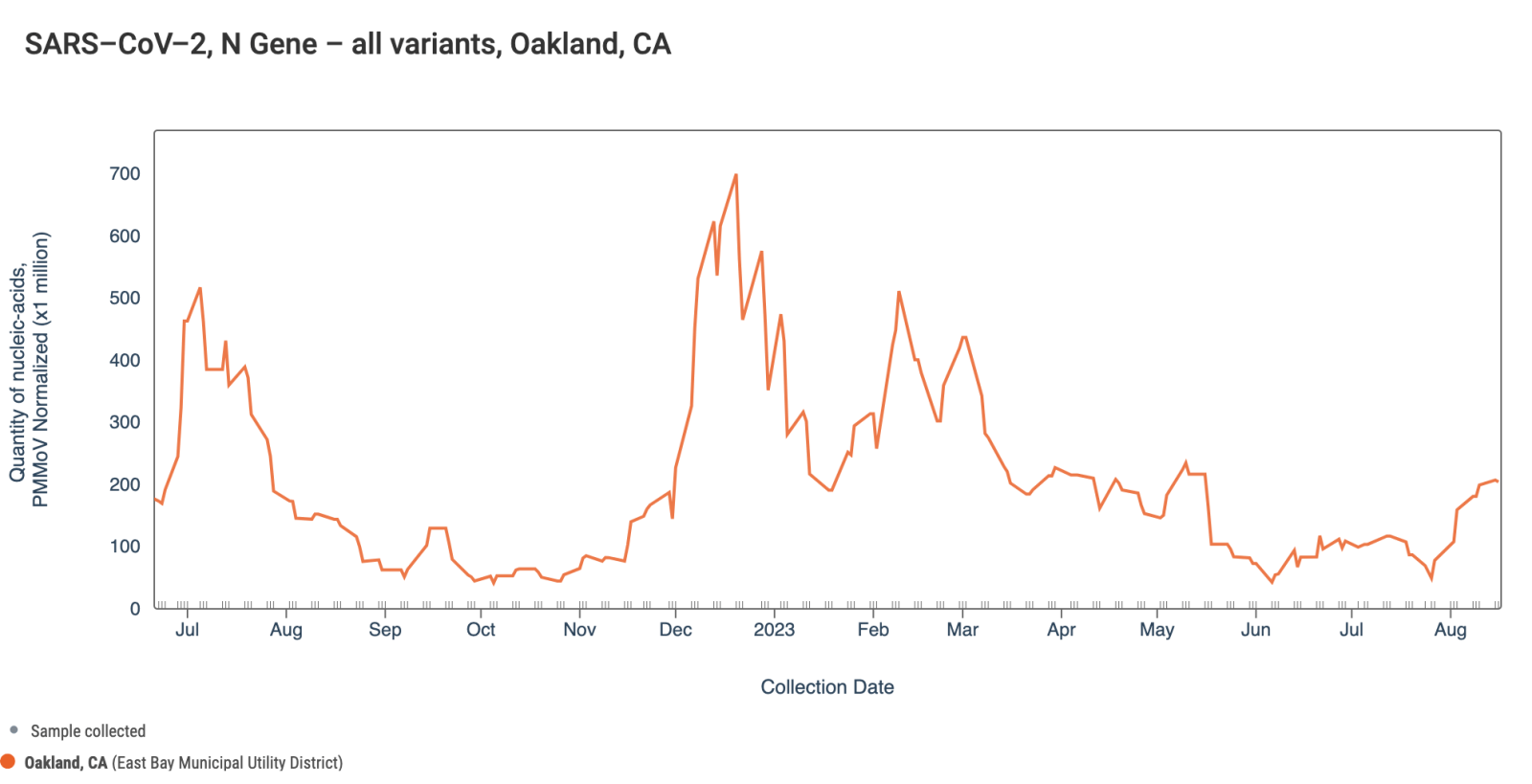Oakland and Berkeley are again experiencing a COVID-19 surge, although the spike is far below what occurred during this same period last year, according to wastewater data, test positivity rates, and emergency department hospitalizations.
Dr. Noha Aboelata, CEO of Roots Community Health Center in East Oakland, said several factors are at play during a surge: new variants, people not being up-to-date on their COVID boosters, and traveling each play a role.
“Most people haven’t had a booster in nine months or even longer,” she said. “We have a perfect storm of some waning protection from being far out from vaccines or boosters.”
Everyone six months and older is eligible for at least one bivalent booster, except people at high-risk who may qualify for a second bivalent booster.
A new subvariant of Omicron called XBB—a strain that shares lineage with EG.5 or “Eris”—is the latest variant accounting for the growing number of cases locally and across the United States. It accounts for about 7% of all new infections in the Bay Area region, according to the state’s communicable diseases assessment tool.
Alameda County PCR test positivity rates were down to around 5% in June, then began to climb. The rate is roughly 12% now. Positivity rates only account for people who do a PCR test. The county last saw a huge COVID surge in February, at the peak of the flu season.

Wastewater testing conducted in Oakland shows that the amount of SARS-CoV-2, the virus that causes COVID-19 has increased since late July.

Local wastewater data also shows that the amount of the virus being detected during the current surge is still far below what occurred this past winter and in the summer of 2022.

Getting a clear picture of COVID infection rates became harder, said Aboelata, after the federal COVID-19 Public Health Emergency Declaration ended on May 11.
“It’s gotten more difficult [for members of the public] to access testing, and the data reporting has changed substantially,” she said. “We’ve had to really recalibrate how we’re keeping tabs on what going on with the pandemic.”
Understanding the extent of a surge, she said, now requires “patching” together the available data from wastewater, hospitals, and local governments.
Wastewater testing in Alameda County does not currently show any significant levels of influenza or RSV, a respiratory virus, noted Aboelata. So people experiencing cold-like symptoms should test themselves for COVID.
“It’s important to distinguish what it is that you have,” she said, “and the only way you can do that is by getting tested.”
How to get COVID tests, vaccines, and treatments
Some community testing sites in Oakland shifted their services from providing free testing for everyone to focusing on only those underinsured or uninsured.
- In Oakland, Color Health is operating seven community testing sites for people who are symptomatic or exposed to someone with the virus. The hours vary by location.
- La Clínica de la Raza is currently only testing underinsured and uninsured patients. PCR tests, as well as at-home test kits, are free for this group. Register on Clinica’s website for testing site locations and hours.
- Roots Community Health Center in East Oakland is open to all members of the public on Thursdays and Fridays from 1 p.m. to 4 p.m. The clinic offers both antigen and PCR testing. Roots also provide the Pfizer, Moderna, and Novanax COVID-19 vaccines and the bivalent booster. Pre-register online or register on-site.
- The Alameda County Public Health Department has a list of community sites that offer antigen and PCR testing, COVID-19 treatments, and vaccines
Health insurance providers are no longer federally required to cover over-the-counter COVID-19 test kits at pharmacies, but California is continuing payments to participating pharmacies for these tests for at least through Nov. 11. Residents should check with their local pharmacy to confirm the availability of tests.
Under California law, those enrolled in a health-care plan will also continue to receive PCR testing, vaccines, and up to eight at-home testing kits per month, free of charge. The free resources will continue for at least the next six months as long as COVID services are provided through their health-care network. For example, Kaiser members can order up to eight tests monthly, in person, or via mail.
Medi-Cal beneficiaries will continue to receive COVID testing, vaccines, and treatments free of charge while the federal supplies last.
Vaccines, treatments, and at-home tests will remain accessible for most Medicare patients. However, PCR testing will only be covered when ordered by a health-care provider. Those with only Medicare Part A (hospital-based care) will no longer have access to the free at-home test kits.
A new booster designed to target the XBB variants is expected to be available at the end of September, pending approval from the Food and Drug Administration and the Centers for Disease Control and Prevention. People will be able to receive both the booster and flu shot at the same time.
Aboelata said that given the current rise in COVID cases, she would recommend that people mask indoors in crowded public places, although official public health agencies no longer require it.
“I haven’t stopped wearing masks in indoor environments because I still don’t want to get COVID,” she said. “Relaxing when it seems like cases are lower, and then stepping it up and putting on a mask when cases get higher… Yes, we are at that point.”
Correction: The original headline of this article stated that “health officials” recommend masking during the summer surge. There is currently no mandate from public health agencies to wear masks indoors.

